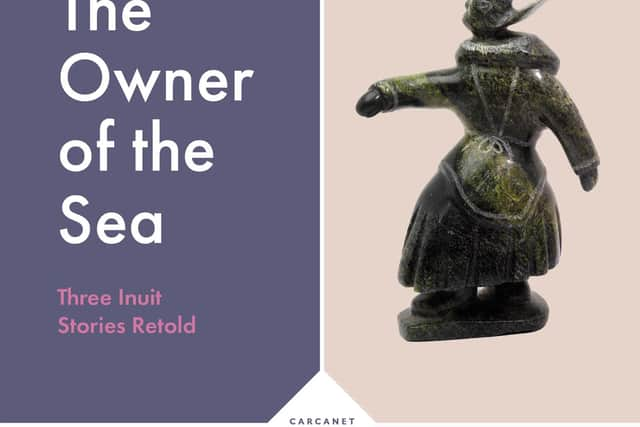Book review: The Owner Of The Sea, by Richard Price


When I was a schoolboy – admittedly an odd one – I developed an obsession with epics. My classics teacher gave me the Iliad, the Odyssey and the Aeneid. My English teacher gave me Paradise Lost. I flustered around the library until I found Dante, and then Statius, Lucan, Apollonius of Rhodes, the Babylonian Gilgamesh story, the Finnish Kalevala, the Prose Edda of Snorri Sturluson, the Mahabharata, the Ramayana, the problematic Ossian poems and more. I thought I had maybe ticked off “epic” on my “things to read” list. But I have always kept a keek out for an epic, and always been surprised. Gods, the fundamental nature of humanity, bizarre humour, fighting – what’s not to like? What’s not to like about being surprised?
So it was with joy that I received my copy of Richard Price’s The Owner Of The Sea. It is, in his own words, a retelling of Inuit stories, done askance since “storytellers modernise, contextualise, are sensitive to and ask questions of their audience, and they explain as well”. Price is a formidable writer whose work I have long both followed and appreciated. He was associated with an informal grouping of Scottish poets called the Informationists, which included Robert Crawford (who has recently been working on Greek texts), the Francophile David Kinloch and WN Herbert, whose reinventions include McGonagall and Stan Laurel. But Price’s eye is focussed on far less well-known territories.
Advertisement
Hide AdThe Inuit are intriguing. Before contact with the wider world, they were probably the only culture with no access to intoxicants. But they did have shamanism, which, as David Lewis-Williams has shown, has very similar qualities. This is very evident in these three poetic narratives. Price gives us a creation myth in Sedna the Sea Goddess, an interlude entitled “The Old Woman Who Changed Herself Into A Man” and a long sequence on the hunter Kiviuq. We might think of the Arctic as both physically and metaphorically frozen, but the signature note here is transformation and metamorphosis. Particularly in the Kiviuq parts, we encounter a woman who is a woman and a fox, a family that slip between being bears and humans, a skeleton of a fish that returns to life and many other weird interlacings of the supernatural and the mundane. Kiviuq kills his first seal and wears its skin, and his grandmother states “You already had seal-like eyes. You take after your father. / The disguise is perfect”.


There is a difference between genuine myth or folklore and the confections of legend and fantasy. Whereas the chronicles of Middle Earth by Tolkien or GRR Martin’s Westeros has a consistency, the true myths are contradictory, ambiguous, always shape-shifting as much as the characters. Price captures this with precision. The stories veer between the astonishingly scatological to the sublime. There is a rapt sense of the natural world, right next to a wife being fashioned out of faeces. (That did remind me of the poem in the Bannatyne Manuscript, “How the first Helandman of God was maid, Of ane Horss Turd, in Argylle, as is said”).
Price’s poetry has always had a lapidary quality balanced with a lilting, almost nursery rhyme rhythm. It works exceptionally well in this collection. There are moments of haunting, as in the quatrain “Can tenderness only find comprehension / between creatures promised death soon enough? / Can love only exist between ordinary creatures / who cherish the fragile lives they share?” Two pieces are standout. “The Party” is an Inuit version of the Parliament of Fowls, and very funny indeed. The other is the incantatory “I travel by song”, which might well be a metaphor for the whole book. So too might be the final line: “Have you seen Kiviuq? Is this just the start of his story?”
By coincidence I have been reading Julia Lovell’s translation of Journey To The West in the evenings, published as Monkey King. There are curious similarities between the 16th century Chinese novel and the millennia old Inuit folk tales, a combination of irreverence and philosophy, guile and sincerity. Many readers will know of Wu Cheng’en’s book from the TV series Monkey. Lovell’s translation is both brisk and witty. I first read Monkey some 20 years ago in Arthur Waley’s translation and there is a real delight in having my eyes polished to see it again.
There is no real definition of Informationist Poetry, but it did jangle registers and re-tool forms of official jargon. Monkey King and The Owner Of The Sea both seem to do that. Did Informationism fizzle out? By another coincidence I received a copy of Stefan Mohamed’s pamphlet, The Marketplace Of Ideas (Stewed Rhubarb Press, £5.99) which seems very much like the heir to that movement. It is fresh, contemporary and enormous fun – “I quit my negative-hours job / delivering deliveries to delivery drivers / so they could deliver them” gives a flavour.
All three of these books show that despite the homogenisation of much publishing there is still room for the unusual, the daring, the forgotten and the new.
Advertisement
Hide AdThe Owner Of The Sea, by Richard Price, Carcanet, £12.99. Monkey King by Wu Cheng’en, translated by Julia Lovell, Penguin Classics, £22. The Marketplace Of Ideas, by Stefan Mohamed, Stewed Rhubarb Press, £5.99.
A message from the Editor:
Thank you for reading this article. We're more reliant on your support than ever as the shift in consumer habits brought about by coronavirus impacts our advertisers.
If you haven't already, please consider supporting our trusted, fact-checked journalism by taking out a digital subscription at https://www.scotsman.com/subscriptions